
- Add Listing
- Top Universities
- Top Degrees
- How to Apply for a PhD Program in Turkey
- No Comments
Applying for a PhD program in Turkey can be a highly rewarding endeavor, offering exceptional academic opportunities in a diverse and vibrant cultural setting. At Turquoise Education, we understand the complexities and challenges that aspiring candidates often face in this intricate process. From navigating the rigorous admission requirements to understanding the nuances of the Turkish higher education system, our dedicated team of experts is here to guide you every step of the way. In this comprehensive guide, we will elucidate the essential stages of applying for a PhD program in Turkey, ensuring that you are well-prepared to secure a place in the institution that best aligns with your academic aspirations and research interests. Join us as we explore the path to academic excellence in one of the world’s most historically-rich countries.

Understanding Eligibility Criteria and Prerequisites
The first step in applying for a PhD program in Turkey involves comprehending the eligibility criteria and prerequisites put forth by Turkish universities. Generally, candidates must hold a relevant Master’s degree from a recognized institution, showcasing strong academic performance in their prior studies. In addition to academic qualifications, many programs require applicants to submit standardized test scores, such as the GRE or ALES (Academic Personnel and Graduate Education Entrance Exam). Proficiency in English or Turkish is also a critical requirement, depending on the language of instruction, often demonstrated through tests like TOEFL, IELTS, or YDS. Understanding these foundational prerequisites is crucial, as meeting them will significantly enhance your chances of a successful application.
Furthermore, prospective PhD candidates should prepare a comprehensive application portfolio that includes several key documents. A well-crafted research proposal outlining your intended study objectives and methodological approach is paramount, showcasing your readiness for rigorous academic inquiry. Additionally, candidates are often required to provide academic transcripts, letters of recommendation from previous professors or professional mentors, and a detailed curriculum vitae highlighting relevant research experiences and accomplishments. This portfolio not only reflects your academic capabilities but also your commitment and readiness to contribute to the academic community. Meticulously compiling these documents in accordance with the respective university’s guidelines is essential in presenting a strong and coherent application.
Another crucial aspect to consider is the importance of aligning your research interests with those of the faculty members at your target universities. Investigating potential supervisors and their research domains can significantly impact your application’s success. Contacting faculty members to discuss your research proposal and seek their guidance or support can foster a stronger connection and demonstrate your proactive approach. Additionally, attending conferences and networking within academic circles in Turkey can provide deeper insights into current research trends and opportunities available at different institutions. Building these academic relationships not only enriches your knowledge but also enhances your visibility and reputation within the scholarly community, thereby reinforcing your application for a PhD program in Turkey.
Navigating the Application Process Step-by-Step
The first step in navigating the PhD application process in Turkey involves thorough research and identification of programs that align with your academic and research interests. Begin by exploring the websites of various Turkish universities to gather detailed information about their PhD offerings, faculty expertise, and admission requirements. It is crucial to understand the specific criteria for each program, as they can vary significantly from one institution to another. Additionally, prospective candidates should reach out to potential supervisors to discuss their research proposals and gauge interest, thereby strengthening their applications. Early communication with faculty members can also provide valuable insights into the program’s culture and expectations, helping you tailor your application more effectively.
Once you have identified suitable programs and potential supervisors, the next step involves preparing a robust and compelling application package. This typically includes a well-crafted Statement of Purpose (SOP), highlighting your academic background, research interests, and career aspirations. Emphasize how your research aligns with the faculty’s expertise and the program’s objectives. Additionally, you will need to provide official transcripts, a comprehensive Curriculum Vitae (CV), and letters of recommendation from academic or professional references who can attest to your qualifications and potential for success in a PhD program. Be mindful of each university’s specific requirements, especially regarding language proficiency tests such as TOEFL or IELTS, if applicable. Ensuring that all documents are meticulously prepared and submitted by the deadlines is crucial for a successful application.
After submitting your application package, the waiting period begins, but you can use this time strategically. It’s advisable to keep in contact with the admissions office and your potential supervisors to show your continued interest and to be readily available for any further information or interviews they might require. Many programs may invite shortlisted candidates for an interview or ask for additional materials, such as research proposals or writing samples. Preparing thoroughly for these interviews by reviewing your research proposal and understanding potential questions can significantly enhance your chances. Additionally, stay organized by tracking application statuses and deadlines for any supplemental requirements. Once offers are received, carefully evaluate each option, considering factors like funding opportunities, program structure, and faculty support, to make an informed decision. By maintaining a proactive and organized approach, you increase your likelihood of securing admission to a PhD program that aligns with your academic goals and research ambitions in Turkey.
Key Tips for a Successful PhD Admission in Turkey
One of the key factors for a successful PhD admission in Turkey is to thoroughly research the universities and the specific PhD programs they offer. Each institution has its own set of requirements, specializations, and strengths. By understanding these details, you can tailor your application to highlight your suitability for the program and demonstrate how your academic and research goals align with the institution’s offerings. Additionally, gathering information on the faculty members and their research interests can help you identify potential supervisors whose work resonates with your intended research focus, thereby enhancing the strength of your application.
Another crucial tip for a successful PhD admission in Turkey is to prepare a compelling statement of purpose (SOP) that effectively communicates your academic journey, research interests, and long-term goals. This document is an opportunity to showcase your passion for your chosen field and to articulate how the program aligns with your professional aspirations. Be sure to highlight any relevant experiences, such as published research, academic achievements, and any contributions to your field of study. Additionally, customizing your SOP for each application to reflect the specific strengths and focus areas of the university can significantly enhance your chances of success, demonstrating genuine interest and a clear vision for your academic future.
Equally important for a successful PhD admission in Turkey is to secure strong letters of recommendation from respected professionals in your field. These letters should come from individuals who can provide a detailed and positive account of your academic abilities, research skills, and overall potential as a PhD candidate. It is crucial to choose recommenders who are familiar with your work and can speak to your strengths and readiness for advanced research. Providing your recommenders with ample time to write and specific information about the programs you are applying to can further ensure that their letters are tailored and supportive. Strong letters of recommendation serve as a powerful endorsement of your capabilities and can significantly bolster your application, underscoring your preparedness for the rigorous demands of a PhD program.

- phone_in_talk
- Study Destinations
- Universities
- Scholarships
- person Sign Up person Log in -->
- Study Abroad
PhD in Turkey
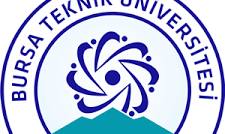
Bursa Technical University
Phd ( bioengineering ).
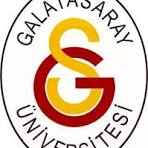
Galatasaray University
Phd ( philosophy ).
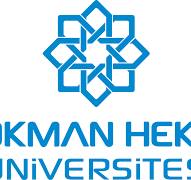
Necmettin Erbakan University
Phd ( biomedical engineering ), why study phd (doctor of philosophy) in turkey.
1. Quality Education: Turkish universities offer a diverse range of PhD programs across various disciplines, providing high-quality education and internationally recognized degrees.
2. Research Opportunities: Pursuing a PhD in Turkey allows you to engage in cutting-edge research projects and collaborate with renowned academics and researchers in your field.
3. Affordable Tuition: Tuition fees for PhD programs in Turkey are often more affordable compared to many Western countries, making it a cost-effective option for advanced studies.
4. Scholarship Opportunities: Turkey offers various scholarships for international students, such as the Turkiye Scholarships program and university-specific scholarships, which can help cover tuition fees, accommodation, and living expenses.
5. Cultural Diversity: Turkey's rich cultural heritage and geographical location between Europe and Asia provide a unique cultural experience for international students.
6. Language of Instruction: Many PhD programs in Turkey are offered in English, eliminating language barriers and facilitating international collaboration.
7. Research Facilities: Turkish universities are investing in research infrastructure, laboratories, and resources, providing you with the tools needed for your research endeavors.
8. Networking and Collaboration: Studying in Turkey allows you to build a global network of contacts, connecting with fellow students, researchers, and professionals from different parts of the world.
9. Geographical Advantage: Turkey's strategic location offers opportunities for travel and exploration across Europe, Asia, and the Middle East.
10. Career Opportunities: A PhD from a reputable Turkish university can enhance your career prospects, opening doors to academic positions, research roles, and leadership positions in academia, industry, and government.
11. Language Skills: While many programs are offered in English, learning Turkish can be advantageous for your daily life, interactions with locals, and potential future opportunities in Turkey and the region.
PhD (Doctor of Philosophy) Specializations in Turkey
Admission intake for phd (doctor of philosophy) in turkey.
1. Fall Intake (September): The Fall intake is the primary intake for PhD programs in Turkey. Most universities open their application periods for the Fall intake around the months of January to April. The exact application deadlines can vary from university to university and even from program to program within the same university. It's recommended to start researching and preparing your application well in advance to meet the deadlines.
2. Spring Intake (February): Some universities offer a Spring intake for certain PhD programs, which typically starts in February. The application period for the Spring intake is usually from September to November of the previous year.
Top 10 Universities in Turkey for PhD (Doctor of Philosophy)
Tuition fees for phd (doctor of philosophy) in turkey.
1. Public Universities: Tuition fees for PhD programs at public universities in Turkey are generally more affordable compared to private universities. For international students, fees can range from around $1,000 to $5,000 per year for non-funded positions.
2. Private Universities: Private universities tend to have higher tuition fees compared to public universities. The fees can vary widely, but they might start from around $3,000 and can go up to $15,000 or more per year for non-funded positions.
3. Funded Positions: Some universities and research institutions offer funded PhD positions, where you might receive a monthly stipend and have your tuition fees waived. Funded positions are usually competitive and might be limited in availability.
4. Scholarships: Many universities offer scholarships for PhD students, which can help cover tuition fees and living expenses. These scholarships can be based on academic merit, research potential, or financial need.
Cost of Studying PhD (Doctor of Philosophy) in Turkey
Eligibility for doing phd (doctor of philosophy) in turkey.
1. Master's Degree: You typically need to have a master's degree from a recognized institution. Some universities might consider exceptional candidates with a bachelor's degree and substantial research experience.
2. Academic Transcripts: Official transcripts of your academic records from your previous studies, including your master's degree.
3. Language Proficiency: Since many PhD programs in Turkey are offered in English, you might need to demonstrate proficiency in English. This can be through standardized tests like TOEFL or IELTS. Some universities might also accept their own English proficiency exams.
4. Research Proposal: Most PhD programs require you to submit a detailed research proposal outlining your research topic, objectives, methodology, and significance.
5. Letters of Recommendation: You'll likely need to provide letters of recommendation from professors, researchers, or professionals who can vouch for your research potential and academic abilities.
6. Statement of Purpose: A statement of purpose or personal statement explaining your academic and career goals, why you want to pursue a PhD, and how the program aligns with your aspirations.
7. Entrance Exam: Some programs or universities might require you to take an entrance exam specific to your field of study. This is more common in competitive programs.
8. Interview: Depending on the program, you might be required to attend an interview, either in person or through video conferencing.
9. Work Experience (if applicable): Some PhD programs, especially those in professional fields, might require applicants to have relevant work experience.
Documents Required for PhD (Doctor of Philosophy) in Turkey
1. Application Form: Complete the university's online application form through their admission portal.
2. Master's Degree Certificate: A copy of your master's degree certificate from a recognized institution. It should be attested or notarized.
3. Academic Transcripts: Official transcripts of your academic records from your master's and, if applicable, bachelor's studies.
4. Language Proficiency Test Scores: If the program is taught in English, you might need to provide scores from English proficiency tests such as TOEFL or IELTS. Some universities might also accept their own English proficiency exams.
5. Research Proposal: A detailed research proposal outlining your research topic, objectives, methodology, and significance.
6. Passport Copy: A clear copy of your passport's information page.
7. CV/Resume: A detailed CV or resume outlining your educational background, work experience, research, and any relevant activities.
8. Letters of Recommendation: Usually 2-3 letters of recommendation from professors, researchers, or professionals who can attest to your research potential and academic qualities.
9. Statement of Purpose: A written statement explaining your academic and career goals, why you want to pursue a PhD, and how the program aligns with your aspirations.
10. Passport-Sized Photographs: Passport-sized photographs that meet the specifications set by the university.
11. Application Fee: Payment of the required application fee, as specified by the university.
12. Equivalency Certificate: For international applicants, a certificate stating the equivalence of your master's degree to a Turkish master's degree might be required. This is issued by Turkish higher education authorities.
13. Health and Medical Documents: Some universities might require medical check-up reports or health insurance documents.
14. Visa Documents: After being accepted into a program, you'll need to provide the necessary documents to apply for a student visa. These might include a visa application form, acceptance letter from the university, proof of financial ability, and more.
Scholarships for PhD (Doctor of Philosophy) in Turkey
1. Turkiye Scholarships: The Turkiye Scholarships program provides full funding for international students to pursue their PhD studies in Turkey. It covers tuition fees, accommodation, health insurance, and a monthly stipend. The program is highly competitive and open to students from around the world.
2. University Scholarships: Many Turkish universities offer scholarships for both domestic and international PhD students. These scholarships can cover tuition fees, accommodation, and living expenses. Each university might have its own scholarship programs, so it's essential to research the specific university's website for details.
3. Research Grants: Some research institutions and organizations in Turkey provide research grants and fellowships for PhD students working on specific research projects. These grants might cover research expenses, travel, and stipends.
4. Government Scholarships: Besides Turkiye Scholarships, various government ministries and agencies offer scholarships for specific fields of study. These might be country-specific or focused on certain disciplines.
5. Bilateral Agreements: Turkey has bilateral agreements with certain countries that allow for academic and research collaboration. These agreements might also include scholarship opportunities for students from those countries.
6. External Funding Sources: Depending on your field of study, you might be eligible for international scholarships from organizations like Fulbright, DAAD (for German students), Chevening (for UK students), and others. Some of these scholarships might also support PhD studies in Turkey.
Jobs and Salary after PhD (Doctor of Philosophy) in Turkey
1. University Professor: With a PhD, you can pursue an academic career as a university professor or lecturer. Salaries can vary widely depending on the university, department, and academic rank. Entry-level positions might start around $1,500 - $2,500 per month, and higher academic ranks can earn more.
2. Research Scientist: Many PhD holders work as research scientists in academia, research institutions, or industry. Salaries can vary based on the organization and your level of experience, starting around $1,000 - $1,800 per month.
3. Industry Research and Development: Industries, especially in sectors like technology, engineering, and pharmaceuticals, hire PhD graduates for research and development roles. Salaries can vary based on the industry, company size, and position, starting around $1,500 - $3,000 per month.
4. Government and Public Sector: PhD holders might work in government agencies, research organizations, or public sector institutions. Salaries can vary based on the position and government pay scale.
5. Consultant: PhD graduates might work as consultants, offering expertise to organizations, businesses, or government agencies. Consultant salaries can vary widely based on the nature of the consulting work, but entry-level salaries might start around $1,500 - $2,500 per month.
6. Data Scientist/Analyst: For PhD holders in fields related to data science, analytics, or quantitative research, roles as data scientists or analysts are available. Salaries can start around $1,500 - $3,000 per month.
7. Entrepreneurship: Some PhD holders venture into entrepreneurship, starting their own businesses based on their research expertise. Earnings can be highly variable and depend on the success of the business.
8. Postdoctoral Researcher: After completing your PhD, you might pursue postdoctoral research positions to further develop your research skills before entering a permanent job role.
- WhatsApp --> WhatsApp

Book your Profile Evaluation to Study Abroad in Public Universities
Get a guaranteed scholarship of minimum 20% to study abroad, please enable javascript to view this page..
Want to skip Verification for now ? Click here
- Phone: +90 312 596 46 43
- [email protected] - for undergraduate application
- [email protected] - for graduate application
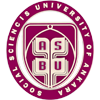
Application for Master & Ph.D. Programs for the 2023-2024 Academic Year Spring Semester is Open!
APPLICATION GUIDE FOR INTERNATIONAL STUDENTS
= MASTER & PHD PROGRAMS =
The results will be sent via e-mail.
Online Application Form : https://obs.asbu.edu.tr/oibs/foa_app/
Upload your documents in either English or Turkish.
Please check the Frequently Asked Questions: https://uo.asbu.edu.tr/en/frequently-asked-questions
E-mail: [email protected]
We use cookies to ensure you get the most of our services
By using asbu.edu.tr, you are consenting to the use of cookies.

- Türkçe
#TürkiyeScholarships2024
Results for the world's most comprehensive scholarship program are announced, #newpagetoeducation, education is the key to success., #charmingasfuture, your future is created by türkiye scholarships., #believeandachieve, success is not an accident. just believe, work hard and achieve, #everythingtoyou, türkiye scholarships are available for undergraduate, master’s, phd and research degrees in a range of subjects, #mysecondhome, türkiye invites you to explore its historical richness and unique nature., #thinkofyourfuture, türkiye scholarships is a government-funded scholarship program granted to outstanding students and researchers., #focusonyourself, türkiye scholarships offers great deal of opportunities for international students, #futureisnow, türkiye scholarships program brings together leaders of the future., what the scholarship cover.
Türkiye Scholarships is which not only provides financial support but also ensures university placement.
Application Criteria
The scholarship program is competitive and merit-based, where next to candidates’ academic excellence.
How to Apply
Applications are received online through the online application system, free of charge.
News & Announcements
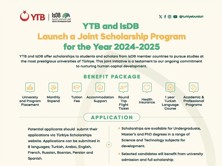
YTB and lsDB Launch a Joint Scholarship Program for the Year 2024-2025
YTB and lsDB offer scholarships to students and scho

International Students Short Film Festival
International Students Short Film Festival is starti
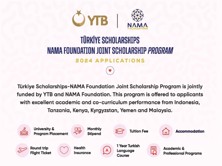
Türkiye Scholarships – NAMA Foundation Joint Scholarship Program 2024 Applications
Türkiye Scholarships – NAMA Foundation Joint Scholar
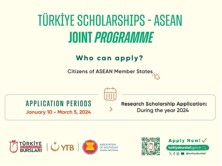
Türkiye Scholarships – ASEAN Joint Scholarship Programme
Türkiye Scholarships – ASEAN Joint Scholarship Progr
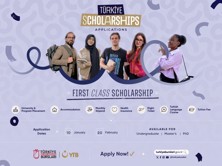
Türkiye Scholarships 2024 Applications
World's Most Comprehensive Scholarship Program!
Program Search

EDUCATION PROGRAM
TÜRKİYE SCHOLARSHIPS GRANTEES
Under Graduate
Designed for Bachelor’s degree applicants in designated courses from engineering to health sciences, humanities to social sciences.
Offers a wide range of programs across social sciences, humanities, natural sciences and engineering at Master’s and PhD levels.
Designed to encourage international researchers and academicians to carry out collaborative academic research in their own fields in the most prestigious Turkish universities.
Tips to Learn Turkish
Best student city i̇stanbul, good to know, calendar & events, frequently asked questions.


IMAGES
VIDEO
COMMENTS
A PhD in Turkey could be the perfect choice for adventurous international students looking for unique study opportunities. Turkish universities have a long tradition of international exchange, relatively low fees and offer a high quality of doctoral training. The guide proves an introduction to everything you'll need to know if you want to study your PhD in Turkey, including information ...
1. Tuition fees are affordable. Public universities in Turkey are very affordable; international students pay tuition fees between 100 and 4,000 EUR per academic year. This is well below the average tuition in countries like the UK, the US, Canada, Australia, or China. 2.
Political Science and International Relations. Ph.D. / Full-time / On Campus. 11,180 EUR / year. 4 years. Istanbul Sabahattin Zaim University Istanbul, Turkey.
Graduate School of Business applications for PhD in Business Administration programs are now open! ... Koç University School of Medicine organized their annual Research Days Koç University is leading Turkey in the QS World University Ranking 2023 Koç University ranked among the top 500 universities in Times Higher Education World University ...
Koç University currently offers 43 Thesis and Non-Thesis Master's programs, including 10 non-thesis Professional Masters Programs in five disciplines and 30 Ph.D. programs in English for talented international students. Please click on the arrows below to discover the programs offered at each of our four Graduate Schools.
Understanding Eligibility Criteria and Prerequisites. The first step in applying for a PhD program in Turkey involves comprehending the eligibility criteria and prerequisites put forth by Turkish universities. Generally, candidates must hold a relevant Master's degree from a recognized institution, showcasing strong academic performance in ...
Why Study PhD (Doctor of Philosophy) in Turkey. 1. Quality Education: Turkish universities offer a diverse range of PhD programs across various disciplines, providing high-quality education and internationally recognized degrees. 2. Research Opportunities: Pursuing a PhD in Turkey allows you to engage in cutting-edge research projects and collaborate with renowned academics and researchers in ...
Find the list of all PHD Programs in Turkey with our interactive Program search tool. Use the filters to list programs by subject, location, program type or study level.
Phone: +90 312 596 46 43; [email protected] - for undergraduate application; Phone: +90 312 596 46 43; [email protected] - for graduate application
Just believe, work hard and achieve! Türkiye Scholarships are available for undergraduate, master's, PhD and research degrees in a range of subjects. Türkiye invites you to explore its historical richness and unique nature. Türkiye Scholarships is a government-funded scholarship program granted to outstanding students and researchers.